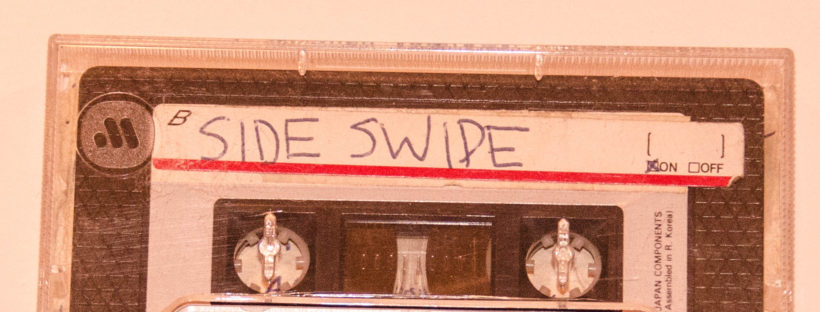If we are lucky, we have friendships in life which help us connect where we came from to where we are going. Mat Darby is that friend for me. We met during high school in small town PA and became almost instant high school sweethearts. I was 15 and he was 18, and our teen romance did not survive his move away to college. In the years after, we built an enduring friendship that has lasted through moves, jobs, marriages, children, good news, and bad news. Sharing a love of music has been a constant theme in our friendship, and we exchanged dozens of mix tapes and mix cds over the decades. On Sunday, January 22, we sat down with the mix tapes that we made for one another. We mused about making them and about how the tapes we made for one another evolved over the years along with our friendship.
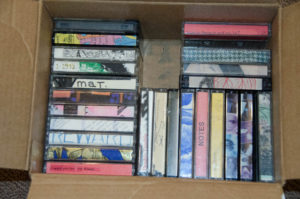
half full box of mix tapes
Mat: I’d forgotten this thing that I did was oftentimes–I didn’t do this with all of them, but a lot of times when I made people tapes, I would make a dub of the tape I was giving away so I could listen to it, too. So it was like I was making you a tape, but I was also making me a tape. Well, the intention was always to make you a tape.
And I remember this tape for your sister being just kind of a weird mix of songs, but also sound bites and weird things.
Sarah: Yes, I remember a lot of sound bites.
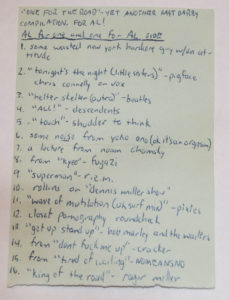
Mat: I think I remember your sister saying at the time something like, “Well, you didn’t really make me a tape, it was just a lot of- ”
Sarah: A sound collage.
Mat: Yeah. Also, thinking about in doing that, the mechanics of recording it, and having to be at the ready with the play and the record, and figuring out that way of, “Okay, you press pause, and you got the play and the record on, and you release it gently so it’s not that ccckkk sound.” –-And I don’t remember, did I call her Al at one point?
Sarah: I think you did that to bother her. [laughs]
Mat: Oh, okay. That’s nice. And I have no idea what the reference here is: “large curd cottage cheese side.” I’ve got a quote each from Emerson and Shelley on the tape. That’s verging on pretentious.
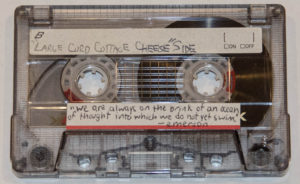
Sarah: Well, I’m looking at a tape that I made for you where I reference Hole so that’s—[laughter] – that’s great.
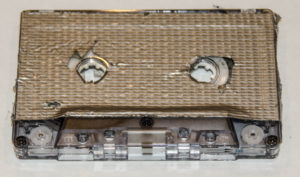
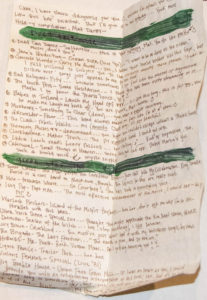

Mat: I think this is the first tape. Is it the one
with the duct tape? Yeah, that’s the first one. Which one of these [tapes that I made you] do you think is one of the first ones?
Sarah: The first one you made me is this one.
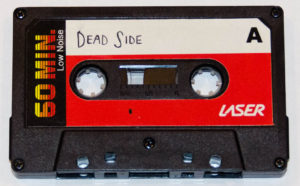
Mat: I remember I was really in to naming the sides of tapes, and I cribbed that idea from R.E.M. because they would name the sides of their albums. Oh, man, and just seeing the songs I chose to put on these tapes.
Sarah: Which ones are you thinking about?
Mat: The Gorilla Biscuits. I probably haven’t listened to the Gorilla Biscuits since right after I made this tape.
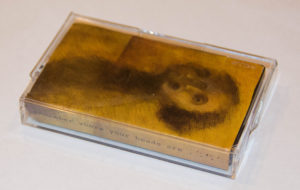
first tape – Mat to Sarah
Sarah: Mm-hmm. I’m looking at these first few tapes that I made for you, and – well, maybe I probably was trying to seem cool, but they’re mainly just very dramatic songs.
Mat: Well, I think, too, it’s that whole idea of are there rules for making mix tapes? Whether there are capital R rules, or rules that you set for yourself, but I think later on, I never would have put two songs by the same band on a tape because that just seemed like you were ruining the potential variety of what could be on a tape.
Sarah: Right. Yeah, there were a few bands that you were very heavy on at that time.
Mat: Yeah, like what?
Sarah: Like R.E.M. A lot of Camper Van Beethoven.
Mat: Yeah, that makes sense.
Sarah: A lot of Dag Nasty, actually, I think. Dag Nasty, Government Issue, that sort of variety of bands.
Mat: Not Dag Nasty specifically, but definitely Government Issue – was [because of] hanging out with friends [who were] listening to a lot of Government Issue.
Is that your handwriting there on the date, or is that mine?
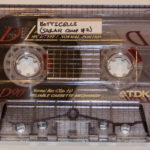
Sarah: No, that’s you. I probably wouldn’t have done anything to these because I would have felt like that would have somehow sullied the original.
Mat: “Music for old women and their dogs.”
Sarah: Yeah, I made this list of the tapes you made for me, and pretty much all of them have titles.
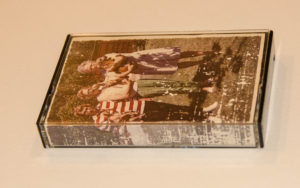
Mat: This was April of 1992. Wow.
Sarah: Okay, so here is the tape I made for you on the back of the inside of an envelope, which I say is subliminally to get you to want to write to me. You must have already gone to college by the time I was making this tape for you.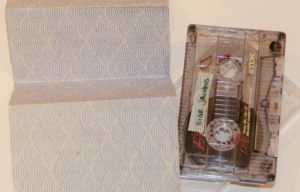
Mat: I bet. Does it have your address on it? Is it the one with the address?
Sarah: Yes. Well, that’s not so subliminal, is it? [laughs]
Mat: Yeah. Okay, so this is Mat Darby Compilation No. 2 because I indicated it as such. Did I put a date on this one? Maybe not.
Boogie Down Productions. That’s amazing. It’s interesting, too, in a lot of these early tapes, it seemed really important to provide at least a little commentary on the song. It’s like, “Here’s the reason I’m putting this really important song on the tape,” rather than letting the song speak for itself.
Sarah: Yes. Yeah, I just saw a note that I made on one of these songs for you that says, “You’ll probably hate this, but- ” Like, “Let me justify this for you.”
Mat: “Let me just assume how you’re going to take this.” Oh my god, I used the worst tapes for these.
Sarah: [laughter] Yeah, I was struck by how many different brands of tapes and tape holders you had. Why was that? Were you just foraging somewhere?
Mat: I mean, if I had to say where these tapes came from, I have no idea. I had a lot of tapes from when I was a kid because – this was maybe Christmas of ’84, I got a boom box with the double tape decks, and I think it was the first time that I had something I could record on. This one in particular seems really just like crappy, crappy tapes. Laser.
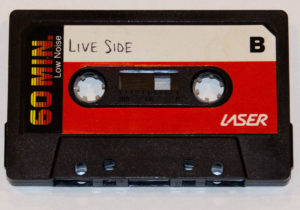
Sarah: Yeah, I don’t even know what that is.
Mat: That’s not a brand, no. I remember getting these, and I don’t think these tapes had cassette cases; they came in a sleeve. They’d be hanging up [laughter] – I’m sure these came from Radio Shack, and there’d be five tapes, and they’d be hanging on one of those little hooks. I wasn’t really thinking about audio fidelity in any way, shape, or form.
I like this tape case that kind of – it’s L-shaped –
Sarah: Yeah, that one’s cool. Where’d you get that one?
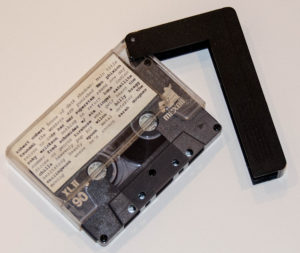
Mat: I have no idea. What year is this?
Sarah: This one kind of needs to be repaired. I haven’t repaired it yet.
Mat: Yeah. A little glue stick will take care of that. That’s the other thing. Well, this is the thing I know now, or should have known at the time: don’t use rubber cement on anything. It’s going to ruin whatever it is you’re trying to do.
Oh, this is a good one. This has gotta be later. Oh, this is your birthday in 2001. Because I put a date on it, which makes sense. It’s funny because knowing I’m an archivist, and dates are important – at that time, I had already gotten out of grad school. [Dating the tapes] would have been an important thing.
I mean, this is a really good one.
Oh my god, my handwriting hasn’t changed much.
Sarah: I have to say I spent a lot of time trying to have nice handwriting on these, which I probably never do now.
Mat: Oh man. “I am punk rock.”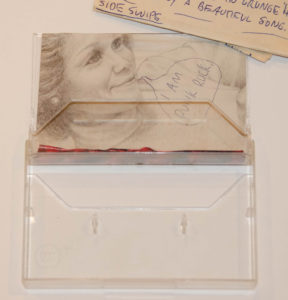
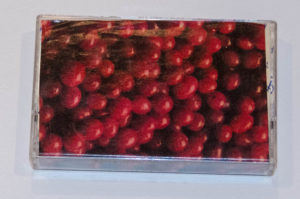
Sarah: [laughter] That one’s an early one.
Mat: Yeah, definitely. I can tell that I was probably trying to impress you. Well, “This is Ocean Spray, Mat Darby Compilation No. 3. Every song on this tape falls into one or more of the following categories: 1.) a cover song, 2.) a song about an animal or somehow related to an animal, 3.) a song about that crazy little thing called love, or the lack thereof. Sorry, no, ‘I was so dicked over songs.’ Listen and enjoy.” I don’t know what that’s about. Man. I can also tell the things that I had probably purchased recently.
Sarah: Yeah, that’s kind of a nice thing, too. I feel like making tapes was a really nice way to engage with the music that you are listening to at the time. It’s like you start to think about how the songs that you like on a certain album fit or don’t fit with the other things you’re listening to, and what they add.
I think I pretty much just kept putting the same bands on these tapes, just choosing different songs. Oh, man, this one’s not even readable anymore.
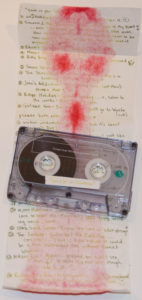
Mat: Oh, is it fading out?
Sarah: Yeah, I guess the paint on the one side degraded the paper and the ink on the other side. It’s kinda cool.
Mat: Oh my god, GG Allin. That and the Yo La Tengo song on this came from this Homestead Records compilation. It was called Human Music. There were lots of bands that I’d never heard of before, and I think this was probably close to the first time I had listened to Yo La Tengo, and then had sought them out. And this was a cover of – which I don’t think I knew until later – was a Jackson Browne song.
Sarah: Really? Wait, what song is that?
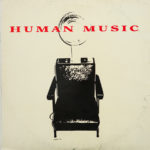
Homestead Records compilation
Mat: Somebody’s Baby.
Sarah: Oh, okay. Yo La Tengo. I thought you meant the GG Allin song.
Mat: No, no, no, no, god.
Sarah: I was like, “He was covering Jackson Browne? That was GG Allin’s Jackson Browne phase?” [laughs]
I just noticed that on this tape that I put two unidentified songs on here. I’m trying to think of how that even would have happened. Maybe I had taped something off of college radio, and I didn’t even know what it was, but I thought I should put it on a mix tape.
Mat: You really liked it?
Sarah: Yeah. I actually just discovered what something like that was a month ago when I was at a record store around here, and the person put on a Connells record, and I was like, “Oh my gosh, I know these songs.”
Mat: I think what I’m seeing here is as it’s gone on, a greater mix of diversity in the songs that I’m putting on here.
Sarah: Mm-hmm, and the genres, maybe.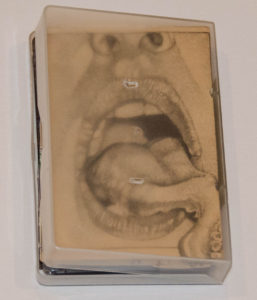
Mat: I got Winnie the Pooh on here.
I’m pretty sure that this art here was in the – I remember I went to DC, and I think these came out of the DC City Paper.
I think this photo here is a statue on the campus of Penn State University.
Sarah: Did you take that photo?
Mat: Yeah.
Sarah: Because it’s a really nice photo. It’s very blue in a nice way.
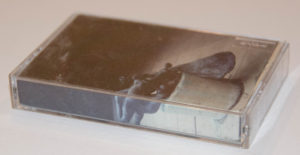
Mat: I think it’s just a shitty disposable camera. Oh, okay, here we go. Yeah, I got into typing out things because I was really in to the typewriter. This fabric is these pants that I made into shorts.
Sarah: I remember. I really liked those.
Mat: Yeah, I wish I still had those. I could probably wear them now. I think I outgrew them at some point.
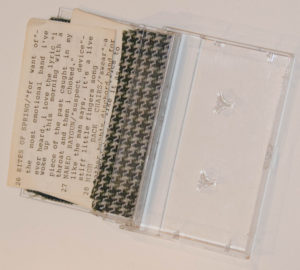
Oh, man, I love this Naked Raygun. “This is a Stiff Little Fingers song. It’s called Suspect Device.”
Sarah: The diversity of genres that you would put on these tapes. For example, Bobby McFerrin, and Burl Ives. Do you think that was representative of the kinds of full length albums you were listening to, or –
Mat: What Bobby McFerrin did I put on there? I remember the Burl Ives. My mom had all of these old 45s, and I think there were two Burl Ives songs that I remember putting on a bunch of tapes for people. One was A Little Bitty Tear, and the other one was Lavender Blue. It might be that those were the A and B sides of that 45. I think it’s part of my inherent sappiness in some respects, but I don’t know, I just like the songs.
I think that’s what it came down to. I wasn’t putting on Burl Ives compilations and listening to them around the clock. I think it was just I picked up on certain songs, and they just stuck with me for whatever reason. What was the Bobby McFerrin?
Sarah: I didn’t find it in here. It might have been on a CD later, but to me, it exemplifies something about the mixes you’ve made over the years, where there’s always something kind of unexpected.
Mat: Yeah, I noticed that, too, in looking at the early ones. The first few are really homogenized in terms of some of their genres and things, and then it gets really mixed up. A lot of that’s probably just, one: feeling probably more comfortable in expressing myself with music, and not feeling like if I put this song on, then “She’s not gonna like me anymore,” or something. Then, it’s like, “Well, even if she doesn’t like this song, it’s not a big deal. It’s something I like, and I feel fine letting her know that.”
—Did you lose the tape?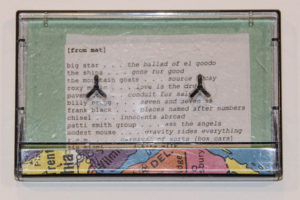
Sarah: It’s somewhere! I was really afraid of doing this interview from the standpoint of me maybe not having taken as good a care – actually, I woke up the other day in the morning and just remembered, I must have been dreaming about it, but remembered that there was a tape that is not here that you had made me. I can visualize it, but I don’t know where it is at this very second. It’s somewhere. I thought, “Oh, I hope Mat is not mad at me.”
Mat: Well, but really, think of all of people you’ve made tapes for, who you’ve given those tapes to, and those tapes are long gone, or that they listened to it once, and they never listened to it again.
There’s one that starts off with “Hate Your Friends.” Yeah, and Arson Garden. This might be a tape I listened to more than any other one.
Sarah: Why do you think you listened to that tape more than any other?
Mat: I don’t know. Let me look. I remember in my dorm room, the bed was up on a loft, and I didn’t have a roommate in my dorm. Underneath the bed was a little shelf where I put the tape deck, and so I could listen to it as I went to bed, so it was really close to the bed, I didn’t have to turn it up very loud.
Then, if I woke up in the middle of the night, I would reach down and turn it back on. It was just music all the time, and I don’t know. There was just something about it. I think a distinction between the tapes you made me at the time and I made you is that yours, I think, there were a lot of softer songs, and so I think it made for a–
Sarah: Good to sleep to.
Mat: Well, good to sleep to, but also good to just sort of listen to and not have it be kinetic, and loud, and distorted.
Yeah. Then, this first one. This was always concerning to me because I think more than once it got stuck in the tape deck in my car.
Sarah: Oh. Yeah, I wouldn’t put this in a car tape deck.
Mat: Well, I did, and it was not pleasant. You had to get a screwdriver or something in there to kind of pop it out, but it always came out.
Yeah. I don’t know, there’s always a lot of bands– let’s see. A lot of bands that would show up, like Arcwelder. You were really in to Arcwelder–
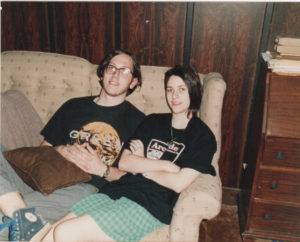
Mat and Sarah in 1992
Sarah: I was.
Mat: – and Caterwaul.
Sarah: I was really in to Caterwaul.
Mat: Caterwaul is one of those bands that if I’d heard it today just out in the world, “Caterwaul, oh, that’s a Sarah band.” Arson Garden, that’s a Sarah band. I mean, even if you didn’t really listen to them all that much, it was definitely just a thing that was sorta connected to you in that way. Warlock Pinchers, definitely. This is the holy grail right here. Seriously, though. Well, the whole question of, “Made you a tape.” You probably said that to me, “Oh, made you a tape.”
Throwing Muses. Throwing Muses are on here, I think the first song, maybe. Are they on here? Yeah they are, Dragonhead. Yeah, I had heard of the Throwing Muses, but I had never listened to them before meeting you. Man, that first Throwing Muses record, some intense shit.
Sarah: How do you think growing up in York, PA in the ‘80s and ‘90s influenced your interest in music, if at all?
Mat: I mean, I think the thing was – I don’t know, I feel like I was inclined to reject a lot of what was happening.
I think a lot of my interest in music came about because I didn’t like – I think it came from not necessarily capital P politics, but looking at the people that I went to high school with and seeing the music that they listened to, and rejecting it because they were either bullies, or hunters, or football players, looking at that and saying, “Well, that’s not what I’m about.” And then thinking, “Okay, what am I interested in musically,” and then – I think a lot of it was listening to music where I knew something about the band or the people, about their politics, and then sort of following it that way.
Sarah: Yes, yes. I think that’s a big difference between the tapes I made for you and the tapes you made for me, is there’s a lot of animal rights-related stuff on these tapes.
Mat: Oh yeah, that makes sense. Also, thinking about – you mentioned Dag Nasty. I remember in, I wanna say 1990, taking the bus from Red Lion and going into York to the library. But down the street from the library was this record store called Flash & Trash.
Yeah, and I still have the tape. It’s Dag Nasty, Wig Out at Denko’s. I remember buying that tape there and just thinking, “This is different. This is a thing that’s different,” and it was probably the first thing I ever bought on Dischord, the first time I ever knew about Dischord, and then seeing the address in the back, and knowing that you could order – just the idea of being able to order music through the mail was a huge thing. And that someone would write you a handwritten note back. That was a huge thing.
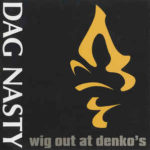
Dag Nasty – Wig Out at Denko’s
Yeah, but just being exposed to in that store, seeing all of the different kinds of music that I’d never heard of, and then slowly going back and buying other things, and getting into buying seven inches, all of that. It was kind of a huge thing.
You know how far York is from Red Lion. It’s not that far. I think the first time I went, I didn’t tell my parents I was riding the bus, but it was seen as sort of a dangerous thing.
You got on the bus, and you went in, and, I mean, I was admittedly sort of not freaked out, but a little bit like, “Well, I don’t really know what to expect.” Also, from the standpoint of walking in this store and not knowing if I’m gonna be called out as a fraud. Well, they’re gonna know that I don’t really know what I’m doing, and I’m looking at all these records, and I’m like, “I don’t know what any of this stuff is,” but at the time, knowing, “Okay, I’ve heard of this band, Dag Nasty.”
Sarah: Dag Nasty was your gateway into Dischord and to indie rock records?
Mat: I think a little bit. I mean, before that was ninth grade, R.E.M. This is very telling, but the whole reason I bought an R.E.M. tape was the girl in front of me that I had a crush on was really in to R.E.M., and I heard her talking about it. I’m like, “Well, I gotta check this band out.”
Sarah: Which record was that? Was it Document?
Mat: No, that was Green, so it would have been ’89. Yeah, and so that was – yeah, that was sort of a gateway into that, college radio, and then Dag Nasty was kind of the gateway into punk and indie rock and all of that.
Sarah: It’s funny; I made this chart of the frequency of tapes that we made each other. Did you think that was interesting at all? Yeah, so when we first met, and we were high school sweethearts, we made a ton of tapes for each other.
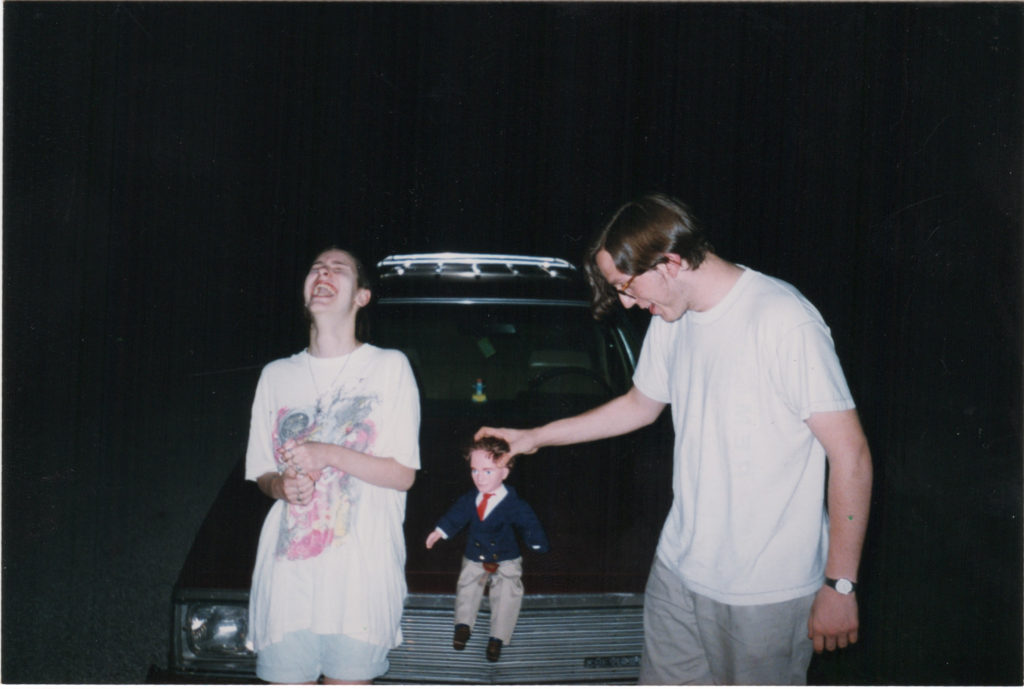
Sarah laughing at Mat and “ideal man” doll 1992
Mat: Oh yeah, and then it depletes, yeah.
Sarah: Then, there’s the dead year where we probably weren’t even talking to each other because it was right after we broke up or something, and then there’s this comfortable a-few-a-year kind of thing, which I think is very reflective.
Mat: Oh yeah. Well, I think the first year of tapes were – I don’t know, it’s hard to say. I mean, particularly the first couple are like, “I’m going to try to impress this person.” I’m going to try to impress this person both with the songs themselves, and then my whole commentary about them.
Just the act of devoting time to making a tape seemed– and it’s sort of silly thinking about it now a little bit, but it’s like, “Well, I’m devoting time not only to making this tape, but it’s in service to this person.” You’re taking the time to do this, whether it be an act of love or an act of friendship, you’re doing this thing for this person.
You and I have probably both made tapes for people where you’ve put a lot of time into it, and they just don’t care. And there’s always that awkward thing of, “Okay, you made the tape for someone,” and then you see them again, and you’re like, “Do I ask if they’ve listened to the tape? Well, they haven’t brought it up. Does that mean they haven’t listened to it, or they’ve listened to it, and they’re just like, “What is this about?” The “made you a tape” [phrase] is, in a lot of ways, sort of a weird shorthand for, “I’ve made you this tape because I’m really in to you.”
Sarah: Right, or at least, “I wanna share something with you.”
Mat: I wanna share something with you. And there’s always this – I mean, not always, but I think there’s always sort of a self-consciousness of making a tape and saying, “Okay, this is not just the tape. This is part of my being, and I’m giving it to you.”
Sarah: Yeah, I noticed with the tapes I made you, those early ones are like, “How can I put my heart on a platter?” The later ones are like, “I bought these seven inches. I think you might like some of them.”
Mat: Yeah. Well, here’s a question for you. Can you imagine our friendship without these tapes?
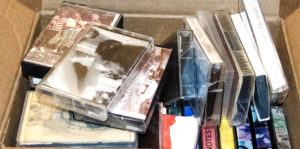
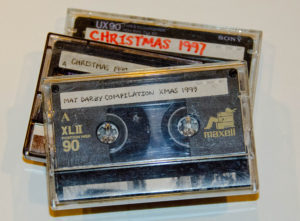
Sarah: Well, that’s a good point. Probably not.
Mat: Yeah, I mean, this – at least here- a year’s worth of tapes, that’s pretty significant. Again, the time that it took to make the tapes.
Sarah: Well, I think it’s also – some of these tapes represent a time period. This was college [for me].
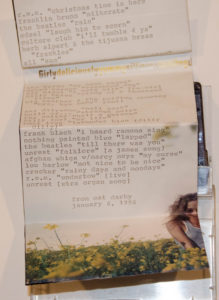
Mat: Yeah, yeah. This one in particular, I just noticed. “You’re leaving for good now, huh?” I think that was in response to me saying – because I think one side is “Pennsylvania”, and the other’s “Delaware”– yeah. That was in response to me saying “Oh, well, I’m not coming back. I’m just gonna do my thing now.” It’s sort of grandiose in whatever statement precipitated this.
Sarah: Right. Yeah, dealing with that transitional period of time.
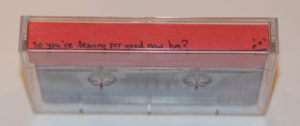
What’s the frequency with which you make mixes at this point in your life?
Mat: Well, see, it’s interesting because we talked a little bit about this the other night. I’m not buying a lot of music, and if I wanted to – I still have the ability to – I have a computer I can play CDs on. I don’t have anything to play tapes on right now, so I can’t listen to these tapes.
Interestingly, we were talking about Spotify; I’ve actually gone back, not all of these, but I’ve gone back– and this is the other thing I wanted to say about mix tapes. Probably, I think everybody says it. But if you ever had a mix tape, and I don’t have a good example, but there’s a part of a song that drops out, or there’s that sound at the end where even if it’s not harsh, you can tell that it’s sort of an audible cue that someone, like you, had pushed a button.
If you hear that song in another context, you wait for the click. It’s so weird. There are songs that I know that I’m almost waiting for it. It’s like, “Oh, at the end of this song, there’s a click,” but there’s no click. That’s not part of the song. But it’s sort of part of the song in the context of the tapes. Also, you’ll hear a song, and you know what the next song should be, but it’s not that song. One of the things that I’ve done is gone back and created playlists, digital playlists.
Here’s the other thing, though, I think my tapes are a little more idiosyncratic than yours – particularly the earlier ones, where I put a lot of little snippets of dialogue and –I mean, it’s probably overkill to a certain extent.
Sarah: No, no, it does have kind of a sound collage quality about it where it’s different influences flying at you quickly.
Mat: Yeah, but I was really in to Henry Rollins’ spoken word stuff, so I’d pull out little things, Jello Biafra, all that stuff that was kind of floating around at the time, and kind of just throwing them in there, which is a lot. I mean, you can do it with audio software, and pull out – but there was just something, again, going back to that physical act of pulling out snippets, and – and also, the juxtaposing of things is always fun.
Sarah: You’ve recreated these tapes in Spotify?
Mat: Well, I mean recreating them in the sense of, “Okay, if I go through the list of songs, is this available?” Because obviously, not all songs are available on there, and if there’s any kind of – that’s what made me think of the idiosyncratic nature of some of the tapes, is when the song cuts off, you can’t recreate that. There are some songs, I’m not kidding you, where it would cut off, and I hadn’t actually ever heard the entire song, and then later, I hear it. It’s like, “Wow, that’s a totally different song, and I only knew the first two minutes of it.”
Sarah: For some reason, I always thought it was okay to do that with instrumentals, which is a very naïve way of thinking about music. It’s like, “Oh, it’s an instrumental. It can be cut off.”
Mat: On one of the tapes, it’s Gridlock by The Pogues. Yeah. That’s one of them I hadn’t heard the full version of until later.
The other thing, and I don’t know if you wanna call it the genealogy of mix tapes, but hearing a song that you’ve put on my tape, and then adding it to a tape that I make for somebody else. You’re like, “Oh, I didn’t know about this band before, but this is a great song.” I think the other thing– and I’ll cop to doing this over, and over, and over again, is there’s these songs that I have probably put on every mix tape that I’ve ever made for someone I was dating.
Sarah: Yes.
Mat: I don’t know if I put it on one of your tapes, All her Favorite Fruit by Camper Van Beethoven.
Sarah: That’s my favorite Camper Van Beethoven song.
Mat: It’s mine, too, and I heard them play it a few years ago at South by Southwest. Did they play it when –
Sarah: Yes, I just saw it two weeks ago.
Mat: Yeah, and it was one of those things where it took it way back. Yeah, but that’s definitely one that comes to mind. It was one of those things where, “Am I just being a hack? Is this a song that I’ve sort of spoiled it by using it over and over again?” I think it’s this thing where it’s all about the context, and about – it’s a thing that means a lot to me and then it’s like, “Okay, I think I’m there. I’m gonna share it with this person.” I mean, frankly, I hope I’m not – cheapening isn’t the right word, but I remember putting that song on a tape for a first girlfriend because I remember buying that tape– I think I bought that tape at a Camelot Music because I had seen them on probably 120 Minutes, or postmodern MTV. I was like, “What is this band about?” Then, that was the song that I kept going back to.
Sarah: I don’t think it cheapens it.
Mat: I don’t either. It’s imbued with a lot of life, and lots of different memories, yeah. Yeah. I mean, it’s on a playlist I made for [my wife].
Sarah: Mm-hmm. The original question to catalyze that was how often are you making mixes now?
Mat: I mean, not terribly often. We were planning on making a road trip mix. We just never got around to it.
Sarah: Yeah. You think it’s time, mainly, is the factor?
Mat: I think it’s time. I think my relationship with music is different in the sense that I tend to listen to new music, but the amount of new music I listen to is less than it was maybe five, ten years ago. I tend to gravitate toward the things that I’ve always listened to, or maybe revisiting things that I hadn’t listened to in a while.
I mean, often just out of curiosity, it’s like, “Does this even hold up anymore?” That kinda thing. I went back and listened to that Miracle Legion album, Drenched. Totally different, just because of age and listening, maybe, a little more closely. It’s a totally different record because you’re seeing it from probably an –
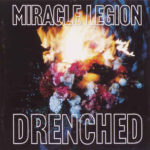
Miracle Legion – Drenched
Sarah: An adult’s –
Mat – an adult’s perspective, yeah. Yeah, there’s a lot of stuff like that.
Sarah: Yeah, definitely listening to that record when you’re like 15, those words mean something totally different than when you’re an adult and you listen.
Mat: Yeah. Also, thinking about when they made that record, they were probably only in their 20s. They weren’t as old as I am now. Is that true?
Sarah: I think they might have been a little older, but I’m not sure.
Mat: Really? Yeah. Well, I guess Mark Mulcahy is what, in his ’50s? ‘60s?
Sarah: I don’t think it’s clear. [laughter]
Mat: [laughter] Indeterminate age. The beard is confusing. I don’t know, though, but I’ll go back to the thing I said before about just keeping the tapes. I have these tapes. I don’t think I ever got rid of a mix tape that anyone gave me. I have a seven-inch box. It’s full of tapes, and I dug these out. I have tapes from my brother. I found a tape from [an old friend from York]. Yeah. Yeah, probably every girlfriend I ever had. I found some tapes that people had recorded songs on one side, and recorded them talking on the other.

Sarah and Mat in 2004
Sarah: Weren’t you part of a mix tape exchange club at some point?
Mat: Actually, you know what? It was CDs. And I’m glad you brought that up. There was a theme every month, and then we’d meet at a coffee shop or a bar, and just exchange our mixes because the idea was that you would show up, and you would make the same mix for everybody, and –
Sarah: You would leave there with ten mixes or something? Whoah, that’s a little overwhelming.
Mat: Yeah, and I got rid of a lot of them. There was maybe one or two that I kept. I did it off and on for maybe a year, but I think the thing that I realized is that I don’t wanna do it this way. You know what I mean? The reason I keep these, it’s because of the music, but it’s also because it’s very much an artifact of a period in my life, of a connection to you or whoever.
Yeah, these CD mixes, like, “Oh, these are all songs from 1983.” Okay. I don’t know this person. Oh, the other thing I think I didn’t like was it was a little bit like the early things where I was writing stuff about the songs.
Sarah: Like, “This makes me cool because I’m about to tell you something that you didn’t know.”
Mat: “Hey, let me tell you what I know about Steely Dan.”
Sarah: [laughter] Did that really happen?
Mat: No, actually, I think it was King Crimson. [laughter] But then, I also realized – I got a CD once where I’m like, “I could have made this. This is my sensibilities,” and then I’m talking to the person, and I’m like, “I don’t really like this person at all.” Musically, we like the same things, but—. I’m glad I did it for the time that I did it, but it wasn’t really a thing that I felt the need to keep up.
Mat Darby is an archivist at the University of Georgia’s Richard B. Russell Library who focuses on documenting the intersection of politics, activism and the public good. Born in Missouri, raised in Pennsylvania, and educated in Delaware and Texas, he currently lives in Athens, Georgia, which he would argue is one of the best college towns in America. He shares a house with his wife, Kristy, and cats Winston and Pippa. And no, he doesn’t know Michael Stipe, but he sees the bassist for Pylon in the neighborhood all the time. Twitter: @matdarby Instagram: @tadmabry

Mat
